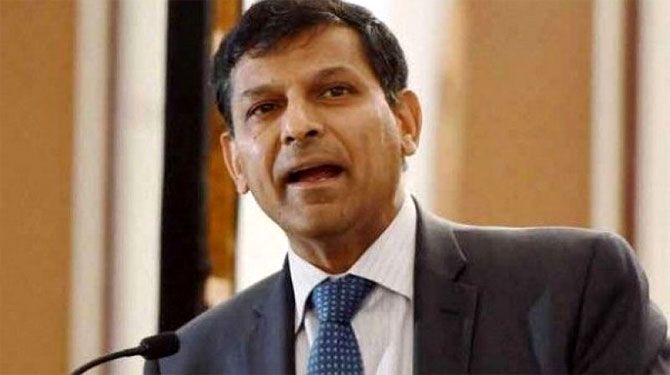'Raghuram Rajan is a wonderful economist, but he is not a wonderful Indian economist.'
'He doesn't understand India in the granular form.'
'India exists only from Delhi to Nariman Point for him.'
'India is much, much bigger and complex.'
'The new RBI governor shouldn't get ready to open his umbrella when it rains in America'

"Instead of being ahead of the curve, Raghuram Rajan became an inflation hawk. In India, the Reserve Bank of India may not have the mandate for growth, but the government requires a governor who also partakes in their agenda for growth," says M R Venkatesh, a chartered accountant and well-known commentator on domestic and international trade and economic issues.
In an interview with Shobha Warrier/Rediff.com, MRV, bottom, left, argues why Dr Rajan's exit as RBI governor is good news for the Indian economy.
How do you think posterity will remember Raghuram Rajan?
We had a legacy of a wonderful set of RBI governors who had done a great job for India in the past. They were great economists in their own right. They were all independent, and had not created any controversy.
Perhaps if I ask your readers who Raghuram Rajan replaced, many of them may not even know. Good governors must not be seen or heard, they must only perform.
Why should they not be seen or heard?
Because a governor's job is supposed to be below the radar and he holds the most sensitive post in the country. The decisions taken by him have a ripple effect on the economy along the length and breadth of the country. So, he must be a person who is neither heard nor seen.
Fortunately, that was the practice till 2013, and then Raghuram Rajan came. He was both seen and heard.
Didn't he do a good job?
I agree he is a great economist. I will give him as many marks as you give to any great economist.
The question is, was he Indian enough? Was he able to look into the issues concerning India?
I will give you some simple examples. He was at the helm of affairs from 2008 to 2009 when he became the economic advisor (to the Government of India) till he became the RBI governor in 2013.
In 2008-2009, the share of corporate borrowing in the banking sector was 25 per cent. In 2014-2015, it rose well over 35 per cent. Now look at the non-performing assets in the public sector banks.
The NPA problem in the banking sector only came to light when the RBI asked banks to declare NPAs. Instead of delaying it further, the RBI in a way exposed the rot in the banking sector. Is that not the truth?
This is where I have a fundamental disagreement. He asked them to show it at the end of 2015. But he has been at the helm of affairs from 2008-2009 till 2016 when the whole problem cropped up. What did he do till then?
Who created the problem in the first place? He was in a position to prevent the terminal illness, but didn't do anything.
 He says he is the man who is fighting crony capitalism, but I am saying crony capitalism happened right under his nose.
He says he is the man who is fighting crony capitalism, but I am saying crony capitalism happened right under his nose.
When he was the economic advisor and then RBI governor, the share of corporate lending went up from 25 per cent to 35 per cent.
He should have asked the banks to cut it down, say, in 2013, and if he had done that, you could say he did a wonderful job.
Look at the Kingfisher loans that were converted to equity. What did Raghuram Rajan do?
There are about 5,000 wilful defaulters. As a regulator, shouldn't he have intervened?
Lastly, there was a news report that even as late as May 2016, some banks were reluctant to file cases against Vijay Mallya. The enforcement directorate had to force them to do so. What did the RBI do till then?
I am talking about the role Raghuram Rajan, the economist, played in India's economy. Let us not give unnecessary credit to this person.
Unfortunately, we have this obsession to give undue credit to moustache-less, accented, foreign-educated, fair-looking Indians. That is our problem.
Are you saying he is not as successful as he is made out to be?
I am saying he is a creation of the media. Am I not giving you facts on what he did? I am saying he was behind the curve in the creation of the banking problem and he was not dexterous enough to identify them.
Tell me one solution that has come from the RBI on the NPA problem?
Why is there this criticism against him that he doesn't understand India?
I told you how the shift happened in lending to the corporate sector. In 2008-2009, 25 per cent of lending was to large corporates and 75 per cent to small, medium and tiny companies.
In 2015, lending to large corporates increased to 35 per cent and the share of lending to the others decreased to 65 per cent.
The question is, who runs India's economy? Fifty per cent of India's GDP comes from small and medium companies. They are the people who have no access to banking, no credit and no formal lending mechanism.
Your kirana store, cobbler, etc are borrowing at 10, 12 per cent as banks will not lend them money, but the fastest growing sector is the unorganised sector.
Banks will lend only to the corporates who are piling up on the NPAs and have only 10 to 12 per cent share in the GDP. The share of the Sensex companies (in GDP) is only 5 to 7 per cent, but they (banks) want to lend to them.
The government came up with a wonderful scheme -- the Mudra Bank -- but the RBI did not go ahead with the Mudra Bank properly.
I don't blame Rajan because he doesn't believe in it. He does not understand India in the granular form. India exists only from Delhi to Nariman Point for him. India is much, much bigger and complex.
Raghuram Rajan is a wonderful economist, but he is not a wonderful Indian economist. He doesn't understand India.
He is criticised for keeping interest rates high, but he says it is done to keep inflation under control.
Theoretically what he says is correct. But you also have to understand that from 2013, our economy was going down. Oil prices the world over were also going down.
If oil prices went down, fiscal deficit also went down, revenue deficit also went down, you should have taken the bold risk of reducing the interest rates and that they were passed on.
Instead of being ahead of the curve, he became an inflation hawk. In India, the RBI may not have the mandate for growth, but the government requires a governor who also partakes in their agenda for growth.
Do you feel that since the interest rates are high, things have become costlier and that is why the there is no movement or buoyancy in the markets?
Today, tomato and dal prices have gone up, but Raghuram Rajan says he has kept the interest rates high to prevent inflation.
Here a big reason for inflation is shortage in supply. Even if you keep the interest rates at 100 per cent, you will not be able to create tomatoes.
This is the classical Western economics of controlling inflation through interest rates. That is okay for Chicago University, but not for the Indian economy. In America, there is no supply shortage, so inflation can be controlled by interest rates.
Do you feel it was because Subramanian Swamy has been asking for his exit that he decided to go back to academics?
I don't want to talk about what Dr Swamy has been talking about him (Dr Rajan).
Fundamentally what he did and did not do are: Right under his nose corporate lending went up. Also, he did not come up with a mechanism to fund the small and medium enterprises.
In the case of NPAs, he did too little and too late.
The accusation is that the government wants a pliable RBI governor and that is why they are not interested in giving him a second term.
I don't know what you mean by pliable. Small and medium enterprises are the biggest vote banks of the BJP (Bharatiya Janata Party).
Now when the vote bank is asking the polity why they are not getting credit, the polity cannot tell them, 'Sorry, Raghuram Rajan does not understand you and we cannot do anything. He will continue and you continue to suffer.' Can an elected MP say this to the voter?
So the word is not pliable, it is one of being considerate to the genuine demands of the government. There is a difference between considerate and pliable.
Those who criticise using the word 'pliable' do not understand politics and the political economy.
Those who accuse this government will accuse this government, anyway.
Don't you feel the way he was treated in the end was a bit undignified?
I agree with you that the end leaves a bad taste in the mouth.
When we spoke about the crisis in banking sector last time, I had said that the RBI was responsible for the mess. At that time, Raghuram Rajan was not the focal point of our attention, but I spoke about the role of the RBI.
There was a strong feeling that he was pulling down the government through media partners and columnists. He was keen on a second term, but the government made it clear that it had other plans. So, he decided to go gracefully.
What kind of a person should the next RBI governor be, especially when the global economy is struggling with crisis after crisis?
Global turmoil will continue for another decade. By and large we are insulated from the global economy for the simple reason that 98 per cent of domestic investment is funded by domestic sales; only two per cent comes from global investment.
So however much you mess up the situation, this two per cent will not go above four or five per cent.
So the new RBI governor has to be rooted to India, and should not get carried away by global events.
He shouldn't get ready to open his umbrella when it rains in America.
Photographs: Dr Raghuram Rajan: PTI Photo. M R Venkatesh: Sreeram Selvaraj











 © 2025
© 2025